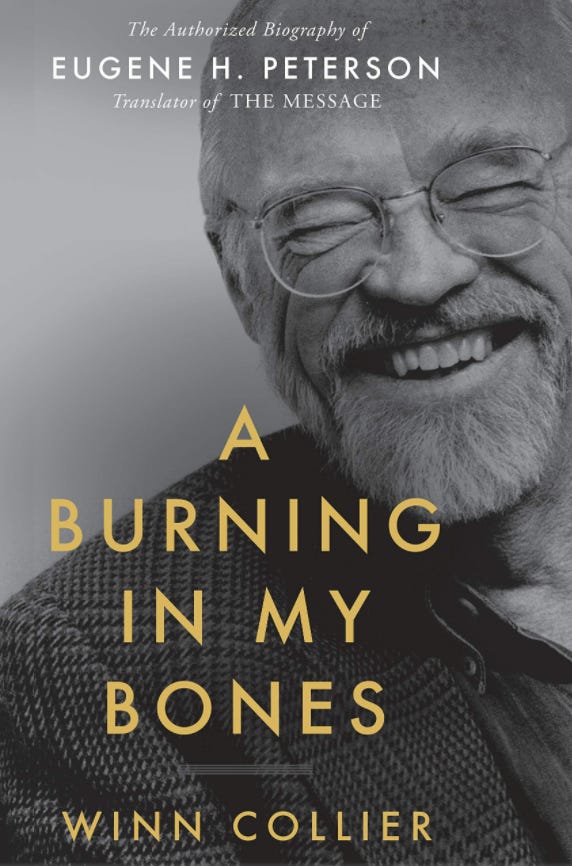Burning in My Bones: Decisions
Being formed by life’s experience will at times lead to decisions that determine direction in our life. Some circle back and change an earlier decision but a decision nonetheless. When Eugene Peterson was learning what pastoring meant at West Park Presbyterian in his first assignment he made decisions that determined his future.
We are reading Winn Collier’s biography of Eugene Peterson called A Burning in My Bones (pp. 78-119), and the schedule for the weekly reading is here: for the reading plan.
What are some decisions – close calls at the time perhaps – that determined the direction of your life?
Photo by Jens Lelie on Unsplash
He pastored and learned pastoring with young adults (“20-30 Club”) and teaching. “West Park’s primary gift to Eugene was letting him practice what it meant to be a pastor, to truly be with people” (80). He wrote to home that said “I like calling [on people] quite a bit” (80).
Willi Ossa, a German who married an American, had heard too much vile theology in the pulpits of Germany but was now living with Mary in NYC. He warned Eugene of what the life of a pastor would do to him – and painted a harsh image of Peterson, which is in the book. This helped him decide the kind of pastor he would be.
Karl Barth: during his career he read through Barth’s Church Dogmatics at least twice.
Tension with his past emerges and one of his respites was speaking in tongues, which was not well accepted in his Presbyterian circles. He despised elitism – and this is a theme I’ve noticed in Peterson over the years. The common person is for him the one to pastor, and he made decisions over time that these would be his people. But he went Presbyterian. He didn’t like the clerical robe (at that time); take me as I am – that was his approach.
It was the Presbyterian way that continued to open for him and he wrote home to say “Everything seems to be opening up that way [to Presbyterianism]. … I’m reluctant to make a decision, but am about ready to conclude that the Assemblies [of God] is a dead-end street for me. In things like this I have no doubt that the Lord will lead me and make the path clear” (86).
He met Harry Emerson Fosdick, who was seen as the arch liberal in many circles, but Peterson’s personal time with him changed his mind, and here again his mind decided to embrace people for who they were and not exclude those who didn’t fit some model.
At a monastic retreat he encountered long periods of silence with others and Collier states that this shaped him for his pastoral calling:
“This subversive encounter was a precursor to themes that would ultimately define Eugene’s ministry: silence as an essential antidote to overly theologized postures (hearing from God is more essential than talking about God) and suspicion toward our ingrained ideas of success (what you know and what you’ve done say little about who you are before God)” (90).
Intellectually gifted seminarians and pastors often ponder professorates, and some who aren’t so gifted ponder it too! It seems like the good life. Peterson’s academic credentials were obvious and he began to work toward a PhD in Old Testament and Ancient Near Eastern studies. He began with William Albright at Johns Hopkins. The offer was stunning to him and the path he was on, but it would involve a major decision about a change of direction.
It’s not. It’s not for all. It wasn’t for Eugene.
“The classroom was too easy. The room was too small and orderly to do justice to the largeness of the subject matter – the extravagance of beauty, the exuberance of the language. Too much was excluded from the classroom – too much life, too much of the world, too much of the students, the complexities of relationships, the intricacy of emotions. The classroom was too tidy. I missed the texture of the weather, the smell of cooking, the jostle of shoulders and elbows on a crowded sidewalk” (116).
Janice Enslow Stubbs, Birmingham Alabama. Her family moved to Baltimore, and she moved with them and went to now Towson University. The decision to marry Jan was a decision not to do a PhD, by now with Brevard Childs, and not to teach at Biblical Seminary but to become a pastor in a Presbyterian church. That decision determined his life. His love for Jan transformed him (117).
“Jan’s passion, her unobtrusive, natural largeheartedness, drew Eugene into a life he had not known he wanted: a pastoral life” (118). She led him out of a world of books into a relational life, and a friend of mine who knew Peterson said Eugene told him “Jan was the pastor.”
Sixty years together.






It's so true that the choices you make will turn around and make you. One of them was moving to the west after high school--college in Montana and seminary in Portland, OR. The other was moving from Montana to the north suburbs of Chicago 15 years ago. The intermountain west shaped me in so many ways, so it was hard to leave. Yet my wife and I sensed that we needed a changed and needed to do the 'missionary thing' and serve in a different culture. Even though I'm a Montanan at heart, I love the community in which we live--landscape, people, opportunities, etc. The people I've met here, as well as the life and ministry experiences I've had here, have been used by God's Spirit, I believe, to shape and form me in ways that would not have happened had I stayed in Montana.
Also, I Ioved Eugene's comment about Harry Emerson Fosdick (p. 89): "I think Fosdick was quite wrong in some of his conclusions, but I also think we were even worse in our vilification." I find that I learn so much from people with whom I disagree. I think it's easy to become too tribal in the Christian community.
One of the difficult aspects of life decisions like you mention is that even making the “right” choice doesn’t mean you won’t face obstacles, burden, and struggle. This can easily turn into regret, which is where those lifelong friendships and meaningful relationships become so important - people who can speak hope, encouragement, and correction into our lives.